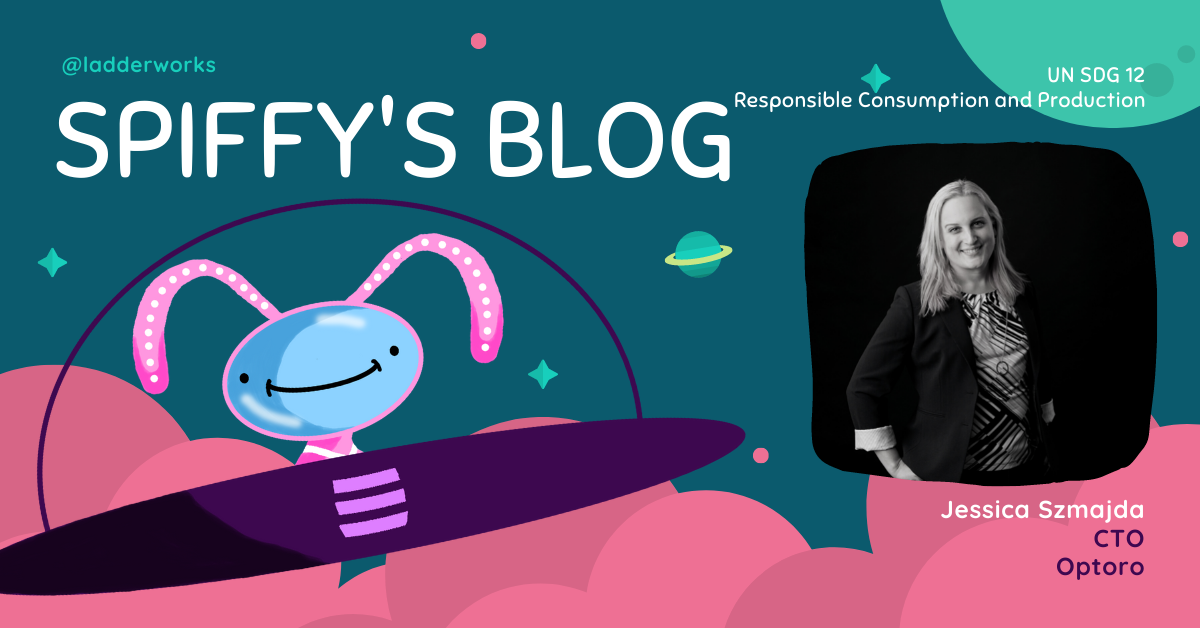Jessica Szmajda: Eliminating Waste in the Retail Supply Chain

Hi everyone, Spiffy here, your one and only interplanetary journalist reporting from Planet Earth. I’m thrilled to be talking to Jessica Szmajda, an entrepreneur working to make the world a better place through furthering UN SDG 12: Responsible Consumption and Production. Today we’re going to chat about her role as CTO with Optoro. Are you ready to be enlightened?
Spiffy: Welcome to the blog, Jess! What challenge is Optoro addressing?
Jess: Thanks for having me, Spiffy! Optoro's mission is to eliminate waste in the retail supply chain by finding the best home for every product with the least amount of churn. Optoro helps retailers optimize their reverse supply chain by helping them process returned and overstock inventory, determining the best disposition for every product. The company’s process helps retailers reduce waste generated by their reverse supply chain while improving recovery on their goods as well.
Spiffy: What motivated you to do it?
Jess: We discovered that most secondary market goods would go from reseller to reseller, through many transactions, transit hops, and lost value, before eventually finding the appropriate buyer. Digging into the source of the problem we discovered that many retailers didn't have the capability to understand what goods were returning to them, nor to properly value those goods or bring them to market. We were disappointed to find that this caused a significant negative environmental impact as well, through waste in packaging, transit, and lost value. We saw an opportunity to leverage technology to determine the best disposition for this returned and overstock inventory at the first touchpoint, eliminating, on average, seven hops from the process.
Spiffy: That’s awesome! Can you elaborate on how Optoro is working towards a more equitable world?
Jess: One way Optoro finds the best home for inventory is through Bulq.com. Some goods are best grouped together into lots, either because they're small or because a specialized seller can add value through their understanding of a specialized market. Optoro's technology groups these products into small lots and sells them on bulq.com. Most reverse supply lots come in truckloads, which small entrepreneurs are generally not equipped to handle. Through bulq.com, Optoro enables a new segment of micro-entrepreneur. These people generally achieve two to five times the return on their investment while also reducing the total waste in retail supply chains. This helps build entrepreneurship globally and drives equity worldwide.
Spiffy: Tell me about a recent company milestone or initiative and the impact that it makes on your community.
Jess: Optoro produces an annual impact report. In 2021 Optoro's systems kept 95% of its clients' returned and excess inventory out of landfills, resulting in 3.8M fewer pounds of waste. Put another way, this means that 22.6M items were sent to reuse channels, reducing the demand on manufacturing and forward supply chains. As a result of these activities, Optoro's technology additionally prevented 13.5M pounds of carbon emissions.
Spiffy: I’m always interested in learning from the manner in which different entrepreneurs react to failure. Can you share an experience when you faced it and didn’t give up? What did you learn from it?
Jess: We didn't always have such a crisp story about our product or its impact. Early on we focused on our ability to sell inventory direct to consumers. Many retailers saw this as competitive and disruptive to their primary business of selling new goods direct to consumers. Their financial teams had already written off their returned and excess inventory as a cost of doing business. Eventually we learned that pitching to CFOs helped us connect the dots to the bottom line, and working with the rising trend of sustainability officers also helped connect our mission to our customers'. The lesson here is to work hard to find not only the right buyer but the right influencers in your customer to paint the full value picture.
Spiffy: Is there anything else you would love to tell our audience before we wrap this up?
Jess: Optoro is a triple-bottom-line business, focused not only on profit but on its impact on its community and on the planet. Reporting on these impacts alongside traditional P&L was quirky at first, but ultimately told the true story of Optoro's mission. Triple-bottom-line businesses are a fantastic way to connect social and environmental impacts to the world of business. I'm proud to have been a part of developing a sustainable, successful business that benefits everyone!
Spiffy: Thanks for speaking with me today, Jess—it’s been an honor!
Jessica Szmajda co-founded Optoro and was the CTO from inception in 2010 through 2019. She was the first female CTO of a major media business at Axios, and is now the General Manager of AWS's VPN business. Outside of work, Jess is a singer-songwriter, an improviser, a gamer, a proud member of the LGBTQ+ community, and a mom to the most wonderful, minecraft-obsessed six year old imaginable. (Nominated by Vaibhav Katkade. First published on the Ladderworks website on April 25, 2022.)
© 2022 Ladderworks LLC. Edited by Anushree Nande. Spiffy’s illustration by Shreyas Navare. For the Ladderworks digital curriculum to help K-3 kids advance the UN SDGs, visit Spiffy's Corner here.

